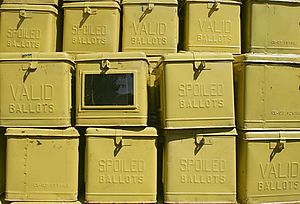For a country less than a week away from a presidential election, it’s awfully quiet in Kazakhstan. According to current President Nursultan Nazarbayev, Kazakhstan is a “paradise,” but Central Asia watchers are skeptical about the lack of competition and lack of policy debate.
“There is not much currently being said about the election in Kazakhstan, mostly because there is nothing to say,” Luca Anceschi, a lecturer in Central Asian Studies at the University of Glasgow told The Diplomat.
The early election, scheduled for April 26, didn’t come as a surprise. Nazarbayev also arranged early polls in 2011, 2005, and in 1999 (even though a 1995 referendum, shortly before scheduled elections in 1996, extended Nazarbayev’s term as president to 2000). Despite coy statements made in March that “[m]aybe it’s time for a change of scenery,” Nazarbayev chose to stand for election, again.
Kazakhstan’s constitution currently limits a president to two five-year terms. In 2007, terms were shortened from seven to five years by parliament. An additional amendment to the constitution in 2007 exempted Nazarbayev from term limits, effectively paving the way for him to serve as president for life. Such constitutional hijinks are a regular feature of Central Asian elections, particularly in Uzbekistan.
The presidential campaign season kicked off on March 26. Legally, the campaign can only last 30 days and must cease two days before election day. Tatyana Okhlopkova, a member of the Kazakhstan Central Election Commission, laid out the campaign rules in an interview with The Astana Times in early April. She noted that “ensuring voter rights during campaign season is always taken very seriously.”
But Anceschi is not so sure:
The entire process has been completely sanitized, with the selection of figurehead candidates (one of them is apparently not campaigning at all) and placement of Nazarbaev at the core of virtually any report appearing on the state-controlled media. The electorate, therefore, can be said to have no choice at all in this election.
Indeed, it is difficult to find any information pertaining to the election on Kazakh media. The homepage of The Astana Times has no reference (as of 4/21) to the impending election. The English-language edition of Tengrinews has a story saying that 70 percent voter turnout is expected, a piece lightly critical of election regulations, and comments from Nazarbayev on the election. In the Russian-language version of the site there is a section for the election, but it doesn’t seem to make reference to the candidates, other than Nazarbayev.
Nazarbayev’s pending reelection “is on the one hand a way to preserve some sort of democracy credentials,” says Anceschi. The election also allows the Kazakh elite to “postpone any difficult decision in relation to power transfer.” Nazarbayev turns 75 this summer and the logical question of who comes after the man nicknamed Papa remains unanswered for now.
The Economist recently called democracy in Central Asia a “managed affair,” and that is an apt description. The region certainly tests the limits of definition when it comes to elections, and there is little reason to believe Kazakhstan’s election Sunday will be any different. The process of elections is ingrained, but the concept of opposition is absent.

































